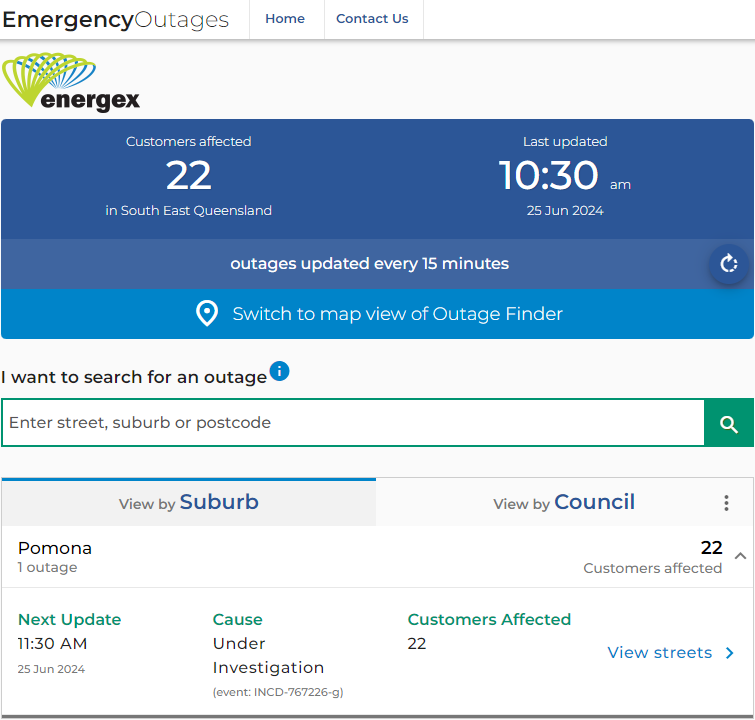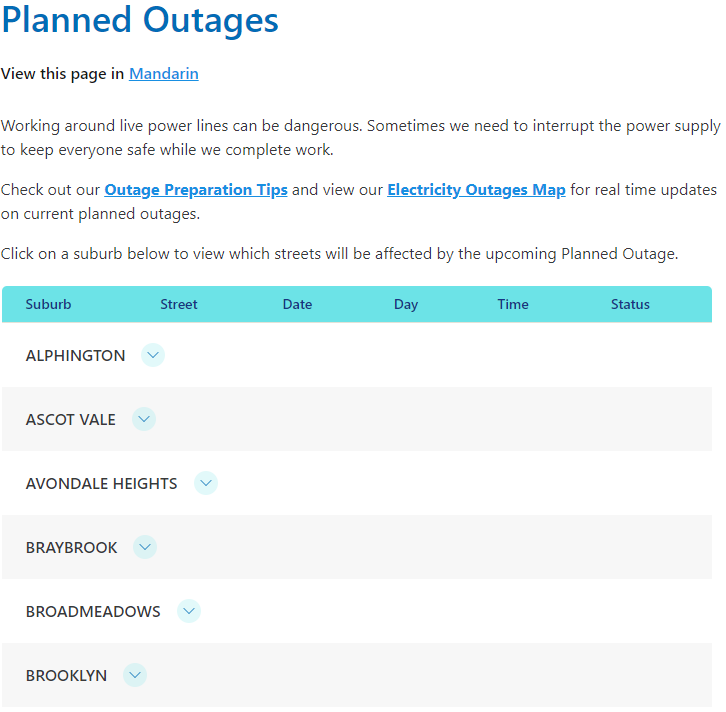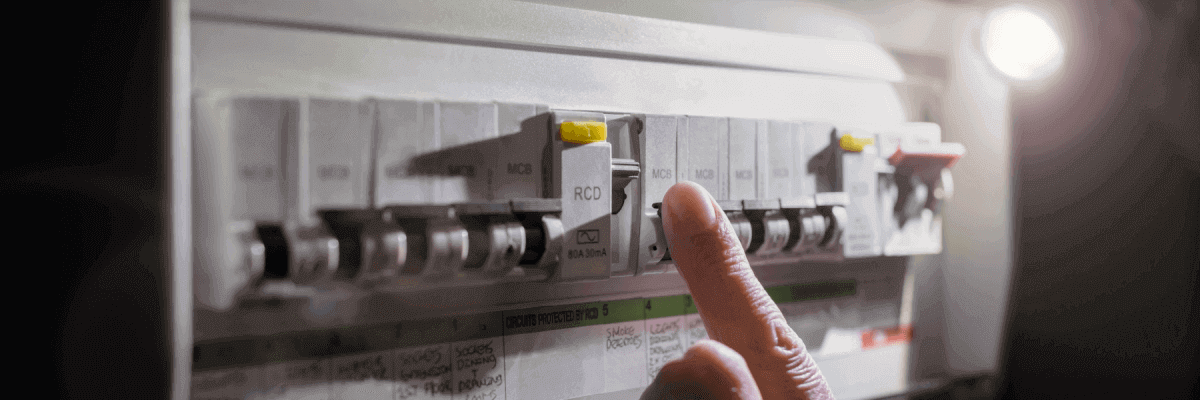KEY POINTS
- A power outage is when the supply of electricity or gas to a household is interrupted.
- Check for power outages, or the loss of gas supply, by searching on the website of your local energy distributor.
- A scheduled power outage is planned maintenance of energy infrastructure, usually carried out by the energy distributor.
Blackouts aren’t uncommon in Australia, particularly in times of increased demand on the electricity grid, or during adverse weather. But a power outage isn’t just an inconvenience: if you’re unprepared, a blackout can be potentially dangerous.
In this guide, Canstar Blue discusses how to handle power outages in your area, including what can cause them and what to do when they happen.
On this page:
What is a power outage?
A power outage is when the supply of electricity or gas to a household or business is interrupted for a number of reasons. Power outages that impact entire neighbourhoods or cities are referred to as blackouts and can occur at any time. Depending on the severity of the power outage, loss of power can last from minutes to weeks, and will usually affect specific areas or electricity grids.
How to find power outages in your area
You can check for power outages, or the loss of gas supply, by searching on the website of your local energy distributor. Energy distributors are responsible for delivering power safely to your home or business, as well as maintaining power lines, pipes and transmission grids in your area. Your energy distributor should have a power outage map on its website where you can input your street, suburb or postcode and receive updates of reported power outages.
The example below comes from Energex, the electricity distributor for South East Queensland.

Image source: energex.com.au
How to find current power outages in QLD
To find current power outages in QLD, visit your provider’s website listed below, or call their faults contact number.
Electricity distributors
← Mobile/tablet users, scroll sideways to view full table →
| Location | Electricity distributor | Faults contact number |
|---|---|---|
| Brisbane, Gold Coast, Sunshine Coast and surrounds |
Energex | 136 262 |
| Country and regional Qld | Ergon Energy | 132 296 |
Gas distributors
← Mobile/tablet users, scroll sideways to view full table →
| Location | Gas distributor | Faults contact number |
|---|---|---|
| South of the Brisbane River, South Coast, Toowoomba and Oakey |
Allgas Energy | 1300 763 106 |
| North of the Brisbane River | Australian Gas Networks | 1800 898 220 |
How to find current power outages in NSW
To find current power outages in NSW, visit your provider’s website listed below, or call their faults contact number.
Electricity distributors
← Mobile/tablet users, scroll sideways to view full table →
| Location | Electricity distributor | Faults contact number |
|---|---|---|
| Sydney’s Greater West, the Blue Mountains, Southern Highlands, Illawarra and South Coast |
Endeavour Energy | 131 003 |
| Country and regional NSW and southern regional QLD |
Essential Energy | 132 080 |
| Sydney, the Central Coast and Hunter Valley | Ausgrid | 131 388 |
Gas distributors
← Mobile/tablet users, scroll sideways to view full table →
| Location | Gas distributor | Faults contact number |
|---|---|---|
| Tamworth | Central Ranges System | 1800 676 300 |
| Sydney, Newcastle, Central Coast, Wollongong and parts of country NSW |
Jemena Gas Networks NSW | 131 909 |
| Wagga Wagga | Wagga Wagga Gas Distribution Network (AGN) |
1800 898 220 |
How to find current power outages in Vic
To find current power outages in Vic, visit your provider’s website listed below, or call their faults contact number.
Electricity distributors
← Mobile/tablet users, scroll sideways to view full table →
| Location | Electricity distributor | Faults contact number |
|---|---|---|
| Melbourne City and inner suburbs | CitiPower | 131 280 |
| Northern and southwestern suburbs | Jemena | 131 626 |
| Western suburbs, CBD and inner suburbs of Melbourne and central and western Victoria |
Powercor Australia | 132 412 |
| East and northeast Victoria and north and east Melbourne |
AusNet Services | 131 799 |
| East and southeast Melbourne and the Mornington Peninsula |
United Energy Distribution | 132 099 |
Gas distributors
← Mobile/tablet users, scroll sideways to view full table →
| Location | Gas distributor | Faults contact number |
|---|---|---|
| Nationwide | Australian Gas Networks | 1800 898 220 |
| Inner, outer-eastern and southeastern Melbourne |
Multinet Gas Networks | 132 691 |
| Western Melbourne, Geelong and some of western Victoria |
AusNet Services | 136 707 |
How to find current power outages in WA
To find current power outages in WA, visit your provider’s website listed below, or call their faults contact number.
Electricity
← Mobile/tablet users, scroll sideways to view full table →
| Location | Electricity distributor | Faults contact number |
|---|---|---|
| South West Interconnected System | Western Power | 131 351 |
| Rural Western Australia | Horizon Power | 132 351 |
Gas customers in Western Australia should refer to the Public Utilities Office, the Economic Regulation Authority (ERA), or Energy Ombudsman Western Australia for any energy-related queries.
How to find current power outages in SA
To find current power outages in SA, visit your provider’s website listed below, or call their faults contact number.
Electricity distributors
← Mobile/tablet users, scroll sideways to view full table →
| Location | Electricity distributor | Faults contact number |
|---|---|---|
| All of SA | SA Power Networks | 131 366 |
Gas distributors
← Mobile/tablet users, scroll sideways to view full table →
| Location | Gas distributor | Faults contact number |
|---|---|---|
| All of SA | Australian Gas Networks SA | 1800 898 220 |
How to find current power outages in NT
To find current power outages in NT, visit your provider’s website listed below, or call their faults contact number.
Electricity distributors
← Mobile/tablet users, scroll sideways to view full table →
| Location | Electricity distributor | Faults contact number |
|---|---|---|
| All of NT | Power and Water Corporation | 1800 245 090 |
Gas distributors
← Mobile/tablet users, scroll sideways to view full table →
| Location | Gas distributor | Faults contact number |
|---|---|---|
| Contact energy provider for availability | Power and Water Coorporation | 08 8936 4649 |
| Australian Gas Networks | 1800 427 532 |
How to find current power outages in the ACT
To find current power outages in the ACT, visit your provider’s website listed below, or call their faults contact number.
Electricity distributors
← Mobile/tablet users, scroll sideways to view full table →
| Location | Electricity distributor | Faults contact number |
|---|---|---|
| Most of the ACT | EvoEnergy | 131 093 |
| A small portion of the ACT and Queanbeyan area |
Essential Energy | 132 080 |
Gas distributors
← Mobile/tablet users, scroll sideways to view full table →
| Location | Gas distributor | Faults contact number |
|---|---|---|
| All of the ACT | EvoEnergy | 131 909 |
How to find current power outages in Tas
To find current power outages in Tas, visit your provider’s website listed below, or call their faults contact number.
Electricity distributors
← Mobile/tablet users, scroll sideways to view full table →
| Location | Electricity distributor | Faults contact number |
|---|---|---|
| All of Tasmania | TasNetworks | 132 004 |
Gas distributors
← Mobile/tablet users, scroll sideways to view full table →
| Location | Gas distributor | Faults contact number |
|---|---|---|
| All of Tasmania | Tas Gas Networks | 1802 111 |
What causes electricity outages?
Power outages can be caused by:
- Weather: Heavy rainfall, heatwaves, high winds and lightning strikes
- Vehicles: Motor accidents damaging power lines
- Bushfires: Electricity supply can be cut during emergencies
- Animals: Wildlife can interfere with energy infrastructure
- Maintenance: Sudden drops in electricity supply can short or trip circuits
- Trees: Blackouts can also occur when overhanging branches or trees come into contact with power lines.
How to prepare for a power outage
The Australian Energy Market Operator (AEMO) has warned that the risks for Australia’s energy reliability are increasing and facing challenges. With delays in project developments and closure of coal generators, the following years could be impacted by increased blackouts. With this in mind, here are some essentials you should keep handy when preparing for a blackout:
- Cash
- Candles
- Blankets
- Batteries
- First aid kit
- LED Torch
- Fire blanket
- Fire extinguisher
- Matches or a lighter
- Generator (if possible)
- Battery-operated radio
- List of important contacts
- Portable phone charger and cords
- Bottled water and non-perishable foods
If the power goes out, or you suspect it will (e.g. there’s a severe weather warning), turn off all appliances at the wall. You should also leave a light switch on so you’ll know when power has been restored.
Read more: What to do in a power outage
Compare energy plans
If you want to switch energy providers or compare current plans, check out the Canstar Blue comparison tool below.
Here are some of the cheapest published deals from the retailers on our database that include a link to the retailer’s website for further details. These are products from referral partners†. These costs are based on the Ausgrid network in Sydney but prices may vary depending on your circumstances. This comparison assumes general energy usage of 3900kWh/year for a residential customer on a single rate tariff. Please use our comparison tool for a specific comparison in your area. Our database may not cover all deals in your area. As always, check all details of any plan directly with the retailer before making a purchase decision.
Here are some of the cheapest published deals from the retailers on our database that include a link to the retailer’s website for further details. These are products from referral partners†. These costs are based on the Citipower network in Melbourne but prices may vary depending on your circumstances. This comparison assumes general energy usage of 4000kWh/year for a residential customer on a single rate tariff. Please use our comparison tool for a specific comparison in your area. Our database may not cover all deals in your area. As always, check all details of any plan directly with the retailer before making a purchase decision.
Here are some of the cheapest published deals from the retailers on our database that include a link to the retailer’s website for further details. These are products from referral partners†. These costs are based on the Energex network in Brisbane but prices may vary depending on your circumstances. This comparison assumes general energy usage of 4600kWh/year for a residential customer on a single rate tariff. Please use our comparison tool for a specific comparison in your area. Our database may not cover all deals in your area. As always, check all details of any plan directly with the retailer before making a purchase decision.
Here are some of the cheapest published deals from the retailers on our database that include a link to the retailer’s website for further details. These are products from referral partners†. These costs are based on the SA Power network in Adelaide but prices may vary depending on your circumstances. This comparison assumes general energy usage of 4000kWh/year for a residential customer on a single rate tariff. Please use our comparison tool for a specific comparison in your area. Our database may not cover all deals in your area. As always, check all details of any plan directly with the retailer before making a purchase decision.
You might also be interested in:
How long do power outages last?
Power outages typically last for short periods of time. A resolution will be estimated by the energy distribution network where the power outage occurred. Time estimates will depend on whether the power outage is due to equipment faults, environmental impacts, third party contact, cable digging or weather-related damage.
Australia’s extreme weather events can impact the nation’s energy infrastructure, resulting in damaged or lost electricity grids and long-lasting power outages. It is extremely difficult to give an exact timeframe of how long a power outage will last in those instances. However, your energy distributor may use social media to keep customers informed.
What are planned power outages?
A scheduled power outage is planned maintenance of energy infrastructure, usually carried out by the energy distributor. Distribution networks, powerlines and gas pipes require constant upkeep to ensure that electricity and gas supplies run efficiently and safely to homes and businesses.
Planned power outages will normally be listed on your energy distributor’s website.
For example, Jemena’s website in Victoria lists their upcoming planned outages:

Depending on your distributor, the following information should be provided:
- Outage start date and time
- Suburbs or postcodes impacted by power outage
- Number of customers affected
- Scheduled completion date and time
- ID or job number
- Status (i.e. scheduled, in progress or finished)
In the case of an emergency, call 000.
Original reporting by Simon Downes
Image Source: Brian A Jackson/Shutterstock.com



Share this article